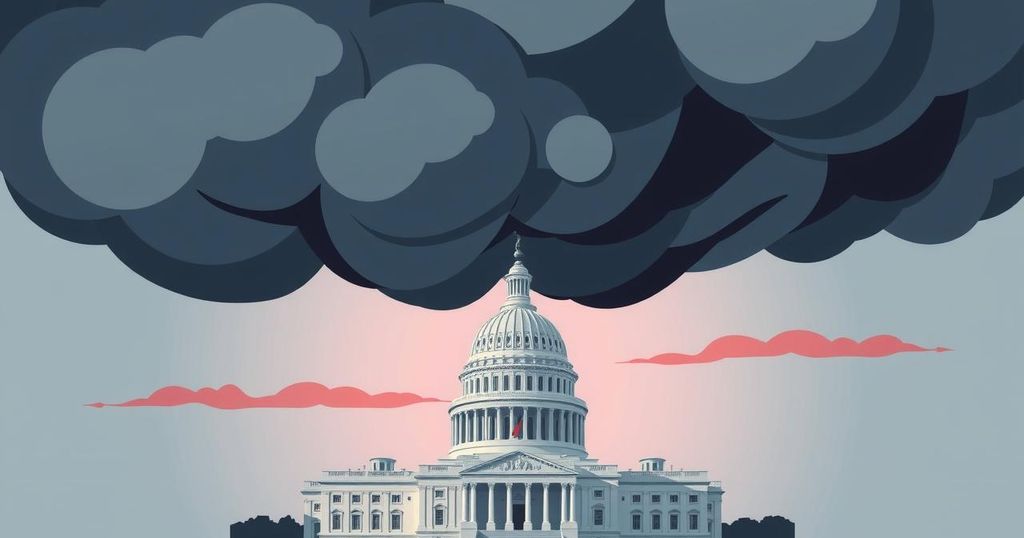The Decomposition of American Democracy and the Call for Unwavering Integrity in Voting Choices
The article critiques the concept of American democracy as a deteriorating myth, particularly in the context of its electoral processes. It highlights the similarities in stance on critical issues between the two major political parties, particularly in their support for Israel amidst the humanitarian crisis in Gaza. The author urges Arab and Muslim American voters to maintain an uncommitted position to reflect their true grievances and to signal their rejection of both parties’ complicity in systemic injustices, ultimately advocating for a reevaluation of their political agency and choices.
The notion of American democracy represents a deteriorating myth, serving mostly to pacify the unsuspecting populace into believing that substantial differences exist between the two primary political parties. In the fervor surrounding the upcoming presidential election, often heralded as one of the most crucial in history, the debate remains framed around a false dichotomy of choices that have persisted throughout American history—between progress and regression, peace and conflict, or democracy and authoritarianism. However, the reality is that the salient issues, particularly regarding foreign policy and human rights, reveal both parties to be aligned, particularly in their complicity regarding the humanitarian crisis in Gaza and the West Bank. The complicity of both Democrats and Republicans in supporting the Israeli government’s actions—characterized by widespread violence and displacement of Palestinians—raises critical questions for Arab and Muslim American voters about the efficacy of their electoral participation. Both Kamala Harris and Donald Trump have demonstrated unwavering allegiance to Israeli narratives, invariably dismissing the term “genocide” when referencing the ongoing violence perpetrated against Palestinians, and have largely ignored the pleas from their constituents for change. This indifference is exacerbated by the portrayal of activists advocating for Palestinian rights as threats or sympathizers with terrorism, which serves to further entrench societal divides. With election day approaching and poll numbers indicating a competitive race, apprehension among Democratic leaders is palpable, particularly as Trump gains traction in crucial swing states with significant Arab and Muslim populations. Attempts at “outreach” from the Democratic Party, particularly in the context of their silence on vital human rights issues, come across as shallow and insincere, as genuine engagement has long been absent. The misguided encouragement for Arab and Muslim Americans to choose between two similarly disingenuous candidates fails to acknowledge the growing discontent within these communities with both parties and their treatment. I implore Arab and Muslim Americans, particularly in pivotal states, to remain independent in their voting choices and to resist the pressure exerted by politicians and pundits alike. This insistence on maintaining an uncommitted stance does not signify cowardice but rather a principled stand against a system that has consistently marginalized their voices and failed to address their grievances. It is vital that they prioritize their moral compass and remain steadfast in their calling for justice for Palestine, rather than succumbing to the binary options presented that ultimately endorse those complicit in systemic injustices. By choosing not to support either Democratic or Republican candidates, they can convey a significant message about their refusal to tolerate the ongoing oppression and injustice faced by their Palestinian brethren. History will witness their choices not as failures but as a bold assertion of agency within a political system that has long rendered them invisible and voiceless. Only through collective resolve and solidarity with marginalized communities can American democracy evolve into something genuine and reflective of its core values.
The article discusses the perceived illusory nature of American democracy, particularly regarding its presidential elections, which are often framed as pivotal moments of choice crucial for the nation’s future. The author argues that despite the rhetoric of difference, both major political parties uphold similar stances on significant issues, notably their support for Israel amidst the ongoing violence in Palestine. This has sparked disillusionment among Arab and Muslim American voters, who face a frustrating dilemma regarding electoral participation amidst perceived complicity in humanitarian crises. The discourse is set against the backdrop of shifting political landscapes as the 2024 election nears, challenging traditional loyalties among marginalized communities and urging a reassessment of agency and power in a flawed electoral system.
In summary, the article compellingly argues that America’s depiction of democracy is increasingly recognized as a flawed myth, particularly by its Arab and Muslim American communities. It emphasizes the importance of maintaining an independent stance in the political arena to assert moral integrity and demand accountability from those in power. As both major parties align themselves with oppressive regimes and systemic violence, it is paramount for marginalized populations to strategically withdraw their support in order to demand a more just and equitable political discourse. The call to remain uncommitted is framed not as withdrawal from civic engagement but as an assertion of self-respect and solidarity with those suffering the injustices of policies favored by both parties.
Original Source: www.aljazeera.com




Post Comment